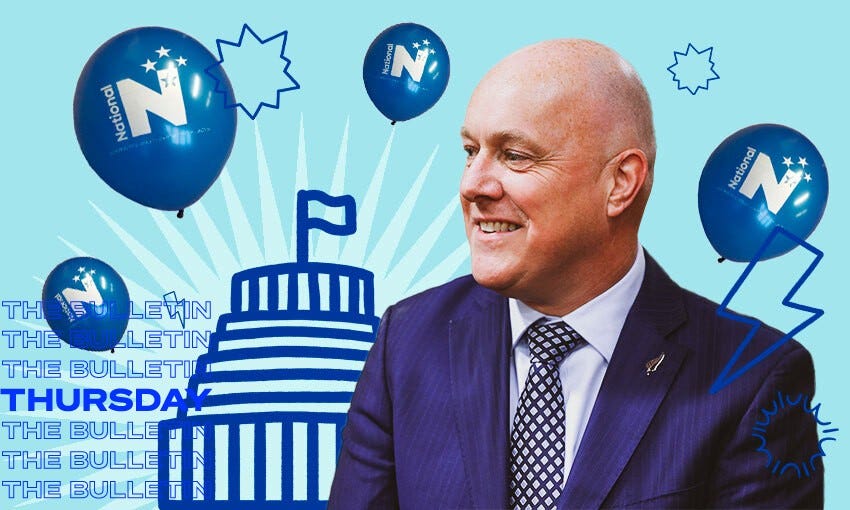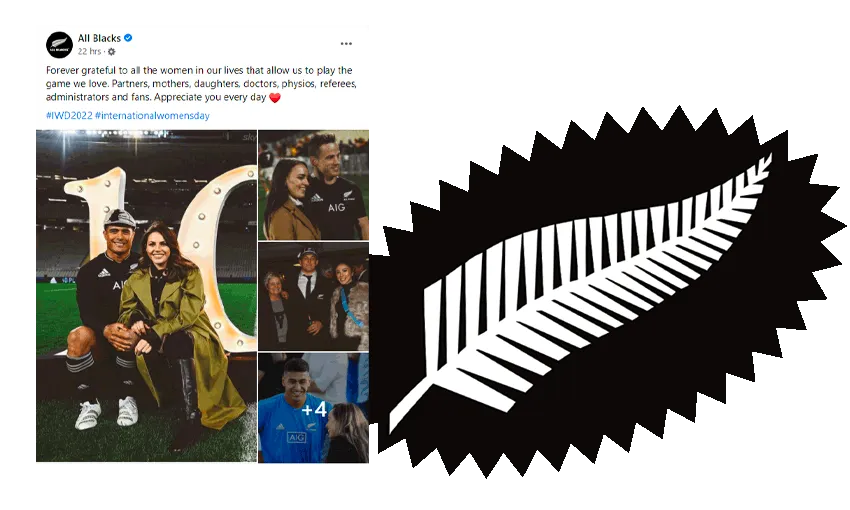An interview with Christopher Luxon
The rookie National party leader reflects on what he now views as a deeply frustrated country
Mōrena and welcome to The Bulletin for Thursday, March 10, by Justin Giovannetti. Presented in partnership with Z Energy.
In today’s edition: Isolation period shortened to seven days; TVNZ-RNZ merger; big changes proposed to three waters; but first, National’s leader at 100 days.
National leader Christopher Luxon doesn’t mention Air New Zealand as much as you’d expect. (Image: Tina Tiller)
The fourth leader of the opposition in two years.
This is Christopher Luxon’s 100th day as leader of the opposition and while it hasn’t been an easy initiation, he’s significantly outperformed his two immediate predecessors.
The National leader sat down with The Spinoff and reflected on what he’s learned so far and what’s coming next. If he’s got two quick observations: The country is tired and deeply frustrated with unclear Covid plans, oh, and house prices need to come down.
After a career in business, Luxon is a numbers guy. But he’s not thinking about budgets or depreciation, instead he’s keeping track of how many kids slept in emergency housing last night. His speech is peppered with aviation metaphors, but there’s less mention of Air New Zealand than you’d expect. Instead, there was an odd element of therapy during an interview that went well beyond its allocated time slot. Most politicians ask personal questions and try to create a bond. He was actually good at it and asked the right questions. Maybe he's more than just another blue suit.
Not backing down on his society divided speech.
Luxon gave a major speech in late February where he described Aotearoa as a “society divided” by the government and prime minister. He seemed to be linking the occupation outside parliament to other reasonable grievances about the Covid response. The response was brutal. Writing in the NZ Herald, Audrey Young said his speech “reeks of opportunism” and he’d misread the country’s desire for unity. Following the end of the occupation, Luxon said it was never his intention to show any support for what was happening outside his office: “There’s nothing about that protest that I endorsed or supported,” he told The Spinoff.
He stands by the speech. He wouldn’t rewrite it. The country is divided, he repeats. “People across New Zealand didn’t support the protest, but they have issues about where we’re going with Covid,” he said. “Across the country, the sentiment is obvious”.
The opposition’s victories shaped the Covid response.
Dealing with that growing sense of frustration is now his main mission. He claims National has been right on most of its criticism so far, whether it’s rapid tests, isolation periods or border settings. Days after he started talking about the end of mandates, the prime minister announced similar plans. Is Jacinda Ardern copying the opposition’s good ideas? Yes, he said.
“We see that with this government, unfortunately. After a very good period of communication in 2020, in the first year of covid — and I fully admit I think the prime minister and government did a good job — the reality is what we’ve seen is everything being made up on the fly, 10 steps behind. We have last mover advantage, being one of the last countries on Earth to deal with this.”
He stops and sips a Pepsi Max. There’s a very specific type of person who drinks a Pepsi Max, and they often become politicians. They don’t want the caffeine or calories, but they’ve got to drink something that isn’t water.
“The clarity isn’t there, the execution is poor, that’s why people are frustrated,” he said of the government’s planning for the next phase of Covid. “As an opposition we’re doing our job, which is to oppose the government, support the government when necessary and offer new ideas.”
…The remainder of this interview is at The Spinoff.
A note from Toby Manhire, editor at large
On Wednesday March 2, the 23-day occupation of parliament came to an end amid terrible and unprecedented scenes on the doorstep of New Zealand’s house of representatives. It was a lot to keep up with – and a lot to get our collective heads around. At the Spinoff we were able to call on Justin Giovannetti, our political editor, to report from the press gallery, while Stewart Sowman Lund travelled to Wellington to run our news updates on location.
More than any protest action in New Zealand history, it needed to be understood not just on the ground, but in the digital undergrowth. Dylan Reeve dived into a teachable moment; I surveyed the key figureheads; Madeleine Chapman raised the alarm on a puff piece. Annabelle Lee-Mather, Justin and I discussed it all on the latest edition of the Gone By Lunchtime podcast (listen here).
The story is far from over, and we’ll continue to pull on the threads: from the global context and conspiracy theories to misinformation, disinformation and social media’s role; from the arguments around mandates to social cohesion.
As we continue to struggle against commercial headwinds, contributions from our members are more critical than ever – we simply couldn’t do this work without their support. If you value what we do, please consider becoming a member today. Donate now.
Isolation period for cases and household contacts is shortened.
Shops are closing temporarily and restaurants are facing staffing shortages as Covid spreads. With the growing impact of omicron infections on businesses across Aotearoa, the government is cutting the isolation period to seven days for cases and household contacts. According to One News, Covid-19 minister Chris Hipkins said most infections take place within seven days. The move follows similar decisions overseas.
MIQ system to largely end by June due to reduced demand.
In a statement this morning, Hipkins’ office also unveiled a roadmap for the future of managed-isolation at the border. By the end of June, 28 of 32 MIQ facilities will go back to being hotels. Decisions haven’t been made yet on whether the remaining hotels will be retained or purpose-built facilities will form the core of a permanent national quarantine system. The prime minister’s office is also creating a new award for the Covid-19 response, with MIQ staff being the first recipients. The name and design of the award hasn’t been finalised.
The Spinoff’s Covid data tracker has the latest figures.
RNZ-TVNZ merger announcement today.
The two state media entities will be coming together after cabinet approved a plan for a single public broadcaster. As the NZ Herald reports, both organisations will be disestablished to create a new entity. Under a new structure, the RNZ arm is expected to remain commercial-free while the TV side will need to create more public interest content while retaining some commercial interests. According to Stuff, the new entity is expected to be in place by mid-2023. Until then, it’s likely the audience won’t see any real changes.
Big changes proposed to government’s three waters plan.
The working group created to scrutinise the government’s proposal to move drinking water, wastewater and stormwater systems to four public entities has come up with 47 recommendations. As The Spinoff’s live updates reports, councils would be given shares in the new entities. It’s an attempt to mollify many councils who have been highly critical of the proposal, with Auckland mayor Phil Goff calling for the city to be excluded from the package. According to The Press, the reaction has been mixed, with many councils feeling the group’s fixes don’t go far enough.
How ‘Z’ became the symbol of Russian aggression.
When Russian tanks moved into Ukraine a fortnight ago, one of the first thing that struck many military analysts was the “Z” symbols crudely painted on their sides. The Cyrillic alphabet doesn’t contain the letter Z. What might have started as a military recognition symbol, is now a way of showing your full support for the Russian regime. The New Yorker has looked at how the letter quickly became everywhere in Russia. While the Russian invasion might still destroy Ukraine, it’s now clearly a shambles. The use of the term “convoy” to describe over 60km of Russian vehicles pointed at Kyiv is now a misnomer. They are increasingly broken down and abandoned. One thing that’s confused me is how Russia’s larger and far more sophisticated air force didn’t destroy Ukraine’s. The Economist explains that early efforts to catch the Ukrainians on the ground failed and they are now fighting back, hard.
Got some feedback about The Bulletin, or anything in the news? Get in touch with me at thebulletin@thespinoff.co.nz
Jen Vermeulen writes that NZ Rugby might have a women problem after a tone-deaf Facebook post. Sam Brooks explains why he ran Round the Bays in his lounge. Jihee Junn (partnership) looks at moves to expand Auckland’s transport ecosystem. Nadine Anne Hura on stories of hope and healing after suicide. David Welch & Nigel French explain that catching omicron isn’t inevitable and avoiding the virus still makes sense.
One of the greatest athletes in American sport is being held by Russia and no one noticed.
National champion, player of the year, the best offensive player in a generation and a two time Olympic gold medal winner. The best of the best, an absolute legend. And held for a month by a volatile global pariah during an offensive war. It says something concerning about society’s views towards women’s sport that Brittney Griner is one of the greatest female basketball players in history and no one noticed she went missing, arrested by Russia. New York magazine chases down an incredible and deeply worrying story.













